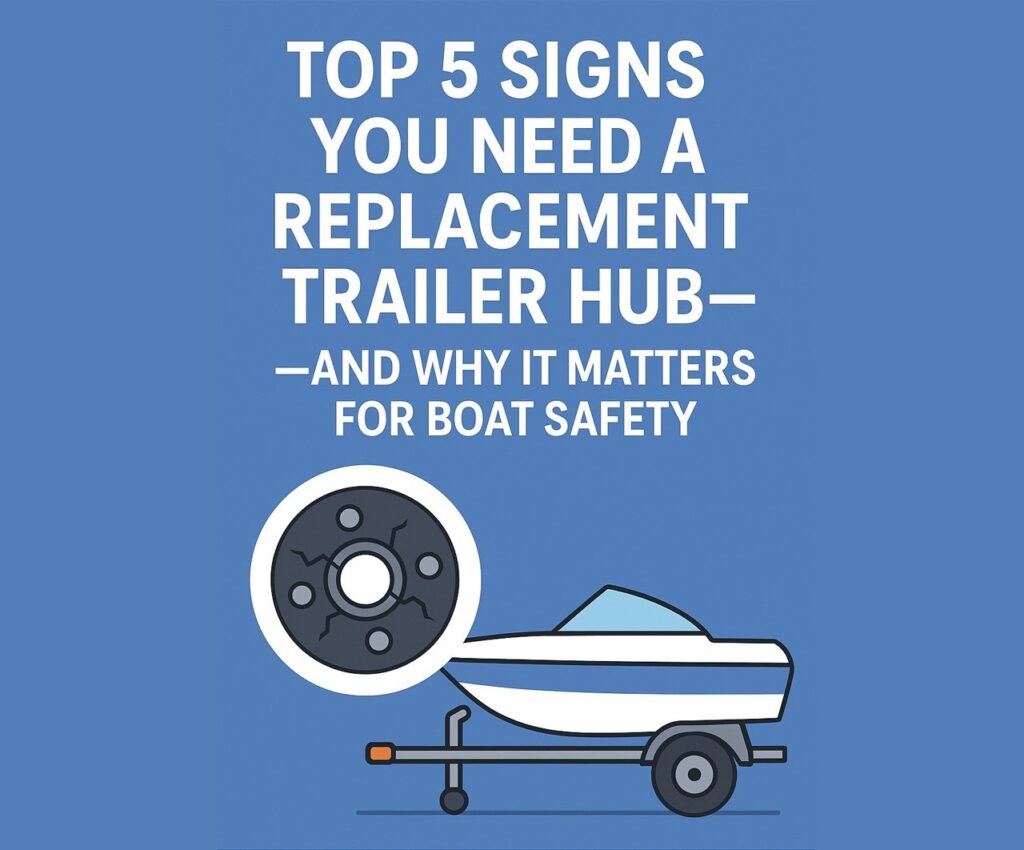For any boat owner, safety doesn’t just start when you hit the water—it begins the moment you hitch your trailer. A critical component that often goes overlooked is the replacement trailer hubs, the very part that keeps your boat secure and your journey smooth. Whether you’re thinking about changing a trailer wheel bearing or investing in a new boat trailer wheel hub assembly, understanding when and why to replace these parts can prevent costly damage and keep your vessel safe.
If you’re not sure when it’s time to act, this article breaks down the top 5 signs that you need a replacement trailer hub—and why neglecting these warnings can lead to disaster. Know More
1. Visible Rust or Corrosion on the Hub Assembly
One of the first signs that scream the need for a replacement trailer hub is visible rust or corrosion on the hub’s exterior. Given that boat trailers are frequently exposed to water, especially saltwater, it’s no surprise that rust becomes a persistent problem.
But here’s the catch—rust isn’t just an aesthetic issue. It compromises the structural integrity of the boat trailer wheel hub assembly, potentially leading to catastrophic failure on the road. Corroded hubs also make changing a trailer wheel bearing much harder, often damaging the bearing seals and raceways.
What to do: If you notice any rust or flaking metal, inspect the entire assembly. Don’t wait for your next trip—start shopping for a replacement trailer hub now. A fresh hub can save your bearings, your axle, and your boat.
2. Unusual Noises Coming From the Wheels
A healthy trailer hub should roll silently. If you begin to hear grinding, humming, or squealing noises while towing your boat, it’s time to check your boat trailer wheel hub assembly. These noises often point to worn-out or improperly lubricated bearings inside the hub.
Neglecting these sounds could result in a full bearing seizure—leaving your trailer stranded and your weekend plans ruined. Worse, the friction can generate enough heat to cause wheel lockup, leading to dangerous road conditions.
What to do: Stop driving immediately and inspect the hub and bearings. Consider changing a trailer wheel bearing as part of your solution, or go for a full replacement trailer hub to avoid long-term damage.
3. Loose or Wobbly Wheels
A surefire indicator of a worn-out hub is when your trailer wheels begin to feel loose or exhibit excessive play when jiggled side to side. This is a red flag for compromised bearings or hub misalignment.
A faulty boat trailer wheel hub assembly puts your tire at risk of coming off while driving—an extremely dangerous scenario especially at highway speeds. This kind of failure could cause your trailer to swerve uncontrollably or detach entirely.
What to do: Jack up the trailer and manually test each wheel for play. If it moves more than a fraction of an inch, it’s time for a replacement trailer hub or a complete changing a trailer wheel bearing service. Either way, don’t delay.
4. Excessive Grease Leakage or Burnt Grease Smell
Grease is the lifeblood of your hub. It lubricates the internal bearings and prevents metal-on-metal contact. When you start seeing grease leaking around the wheel hub or smell burnt grease, it’s a clear sign something’s wrong.
Overheating bearings often push grease past the seals, and in severe cases, the grease catches fire due to excessive friction. This isn’t just a maintenance issue—it’s a serious safety hazard that can escalate into a full-blown roadside emergency.
What to do: Clean off the hub and inspect the seals and bearings. If the problem persists, consider changing a trailer wheel bearing and installing a new boat trailer wheel hub assembly altogether.
5. Mileage and Maintenance Neglect
Even if there are no visible problems, age and mileage alone can justify a replacement trailer hub. Most hubs and bearings are rated for specific mileage, often around 12,000–15,000 miles. If your trailer has clocked in more than that without a full hub service, you’re running on borrowed time.
Lack of regular maintenance, especially after repeated water exposure, accelerates internal wear. Combine that with infrequent lubrication, and you’re one trip away from failure.
What to do: If you can’t remember the last time you serviced your boat trailer wheel hub assembly, it’s time to start fresh. Regular inspection and proactive changing a trailer wheel bearing routine can extend the life of your new hub.
Why Replacement Trailer Hubs Matter for Boat Safety
The safety of your boat and everyone on the road depends on the reliability of your trailer. A compromised boat trailer wheel hub assembly can lead to high-speed blowouts, axle damage, or even complete trailer detachment.
Let’s break it down:
- Stability on the road: A solid hub ensures your trailer tracks straight and resists sway during lane changes or emergency braking.
- Tire preservation: Properly functioning hubs reduce uneven tire wear, saving you money in the long run.
- Bearing protection: A new replacement trailer hub often comes pre-packed with high-quality grease and sealed bearings, extending service life.
- Safety compliance: Many states require trailers to be roadworthy. Failing to replace a faulty hub can result in fines or failed inspections.
Whether you’re hauling your boat across the country or just to the nearby marina, hub reliability is not optional—it’s essential.
How to Choose the Right Replacement Trailer Hub
When shopping for a replacement trailer hub, it’s critical to know your trailer’s specifications. Here are the key factors to consider:
- Bolt pattern: Ensure your new hub matches the wheel’s lug configuration.
- Bearing size: Use calipers or refer to your existing hub’s part number to get a precise bearing size.
- Weight rating: The hub should match or exceed your trailer’s gross weight capacity.
- Water protection: Look for galvanized or stainless-steel hubs if you often launch in saltwater.
Some high-quality boat trailer wheel hub assemblies come as complete kits, including pre-installed bearings, seals, and caps—saving time and reducing installation errors.
Pro Tips: Extending Hub Life and Preventing Emergency Repairs
- Grease your hubs every season—especially after exposure to water.
- Inspect for heat after towing—hot hubs are a sign of friction buildup.
- Carry a spare: Keep an extra replacement trailer hub and tools on board in case of emergencies.
- Don’t skip maintenance: Regularly change a trailer wheel bearing even if it looks okay. Preventative care is cheaper than a breakdown.
Conclusion
Your boat trailer is only as strong as its weakest link—and more often than not, that link is the replacement trailer hub. Whether you’re hearing strange noises, seeing grease leaks, or just due for a check-up, don’t wait until it’s too late. A reliable boat trailer wheel hub assembly ensures smooth rides, safe stops, and peace of mind for every journey.
Investing time and care into changing a trailer wheel bearing or upgrading to a new hub isn’t just good maintenance—it’s essential boat safety.
Looking for high-quality OEM and wholesale trailer hub solutions? Our team provides industry-leading replacement trailer hubs and boat trailer wheel hub assemblies that deliver long-lasting performance and road-tested reliability. Contact us today to find the perfect fit for your trailer. Know More

